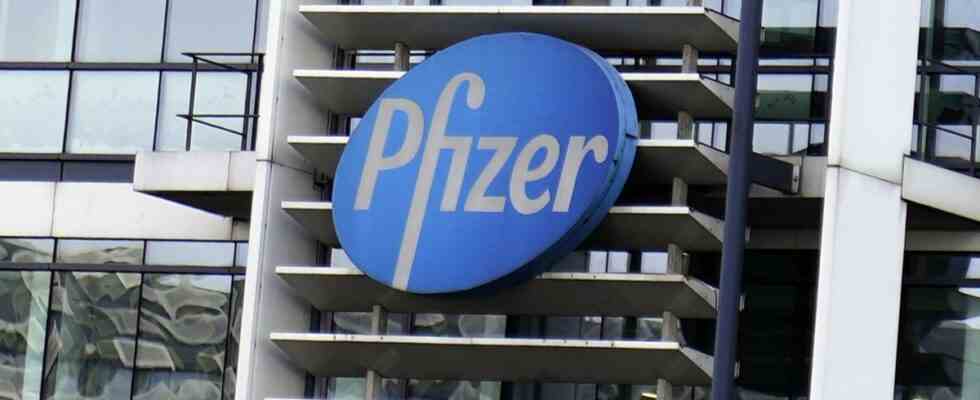A scam “. “A terrible confession”. Falsified clinical trials. Since October 10, accusations have been raining down on social networks against the covid-19 vaccine from Pfizer and BioNTech. In question ? Remarks by Janine Small, president of the pharmaceutical company’s international developed markets, made during a meeting of the special committee on the Covid-19 pandemic in the European Parliament on 10 October.
To the question: “Was it considered that the Pfizer vaccine stopped the virus before being marketed? “, she explained that “no”, the company did not know if the vaccine was effective on the chain of transmission before marketing. This statement was taken to point out that Pfizer had “confessed” that the vaccine had “not been tested” on transmission.
“This admission is important and basically scandalous,” said Virginie Joron, MEP for the National Rally on Sud Radio on October 12. For two years, we were told that it protected, it prevented the transmission of the virus and there, we are told that they did not test something which was the basis of the vaccine campaign. »
In the process, Internet users denounced, based on this admission, a vaccination obligation “Scientifically unjustified” for nursing staff and questioned the health pass.
FAKE OFF
However, the absence of trials concerning the effectiveness of the anti-covid-19 vaccine on transmission before its marketing is known. The Food and Drug Administration American wrote, authorizing the marketing of the vaccine on December 11, 2020, that there was “no evidence that the vaccine prevented the transmission of SARS-CoV-2”. In his recommendation of December 24, 2020, the French High Authority for Health (HAS) also indicated that “vaccine effectiveness on viral transmission does not[avait] not been assessed”.
Against Covid-19, the HAS recommended offering vaccination “as a priority to the populations most at risk of serious forms and those most exposed to the risk of infection, that is to say populations associating in particular an advanced age, comorbidities and collective accommodation conditions”.
“It’s not very surprising”
“That the vaccine has not been tested on the chain of transmission is not very surprising, notes Morgane Bomsel, immunologist and researcher at the CNRS. These are complicated experiences to set up because you pass it on to someone else. When you vaccinate someone, it is the person who undertakes to enter the clinical trial, but if you want to enter the transmission, it is the whole entourage that must be recruited. »
Started at the end of July 2020, randomized clinical trial of Pfizer-BioNtech’s candidate vaccine, the results of which were known in November 2020, opened the doors to marketing authorization. It reported a 95% effectiveness rate in preventing Covid-19 infection. This meant that 162 members of the trial’s placebo group contracted Covid-19, compared to just 8 in the vaccinated group, within seven days of the second dose of the vaccine.
Understanding the efficiency rate
The World Health Organization has detailed on his website what this potential efficacy was, obtained in clinical trials. It allows us to know “to what extent the vaccine reduces the risk of contracting the disease. If the potential effectiveness of a vaccine is high, far fewer people got sick in the group that received the vaccine than in the group that received the placebo. »
This “effectiveness rate” is a formula that deserves to be clarified: “There is nothing wrong in that, but when you question the general public, what people understand is that we are protected against the Covid, underlines Morgane Bomsel. However, that’s not it: we tried to do some pedagogy to explain precisely that this vaccine protected, but it does not protect at all, it protects against serious cases. »
A decrease in effectiveness against infection from the 3rd month
The effectiveness of anti-covid vaccines against severe forms and hospitalizations has been widely evaluated. In October 2021, a large French study confirmed that vaccination reduced the risk of hospitalization by 90%, comparing the data of 11 million vaccinated people over the age of 50 with those of 11 million unvaccinated people in the same bracket. of age over a period of six and a half months.
However, concerning the prevention of infection, recent studies show “a gradual decline in effectiveness from the third month of all vaccines, vis-à-vis infection and symptomatic forms”, recalls the site Vaccination-info-service, managed by Public Health France. The effectiveness of the vaccines varies according to the people and the variants, but, against the serious forms, it remains “at a high level, whatever the vaccine administered”, it is indicated.
“We can regret that we did not work more on a vaccine so that it better prevents infection downstream of transmission, supports Morgane Bomsel. But, Pfizer or Moderna have never claimed that their vaccines block transmission. The authorities could have said: we are not validating, we are working a little more to block the infection, but the world was so distraught that what prevailed was to reduce serious cases to unclog hospitals. »

